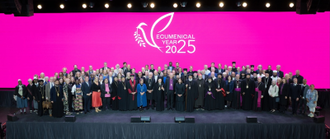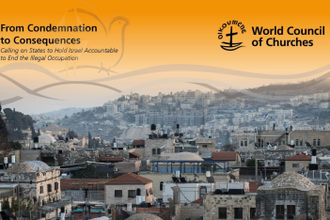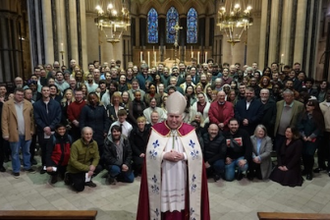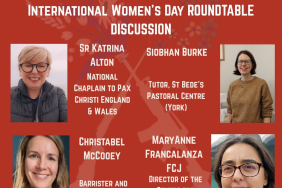'United in faith and action' - global church prays together

Photo: Albin Hillert/WCC
Source: WCC
During a special Ecumenical Celebration in Filadelfiakyrka, Sweden on 22 September, religious leaders from across the world drew together to commemorate the history of the ecumenical movement and to chart a future with even deeper unity and determined action.
The celebration was part of an Ecumenical Week that is commemorating the 100th anniversary of the Ecumenical Conference in Stockholm of 1925, a significant beginning for the modern ecumenical movement. Those presently gathered in Stockholm are celebrating ecumenism, peace, and fellowship.
Archbishop Martin Modeus, archbishop of the Church of Sweden and moderator of the Christian Council of Sweden, reflected on the heritage of the gathering, particularly of the legacy of Archbishop Nathan Söderblom of Uppsala.
"He spoke about the Holy Spirit inviting a flame in the hearts of all who came regardless of where they came from," said Modeus. "Love is not to look at each other but to look in the same direction. We as Christians are asked to stand by the side of Christ to be able to see what he sees, say what he says, and do what he does."
Rev Karin Wiborn, church leader in the Uniting Church in Sweden, introduced the presidium of the Christian Council of Sweden, which represents 27 different churches. "We have been dreaming, talking, and walking together to host you here," she said.
His All-Holiness Ecumenical Patriarch Bartholomew offered a homily, "Time for God's Peace," during which he reflected on the developments and expectations of the ecumenical movement in the face of a fractured world that looks to religious leaders for reconciliation and peace.
"We owe it to our global community to be united in faith and action," said the Ecumenical Patriarch. "We can only offer a credible witness when we stand together in prayerful invocation of God's peace that surpasses our understanding and achievements."
The Ecumenical Patriarch also noted that the commitment of the Ecumenical Patriarchate to the vision and mission of the World Council of Churches has always been unwavering and paramount.
"Today, we can see unfolding before our eyes an increasingly divided world," he said. "Never before has it also been possible for one group of human beings to eradicate as many people simultaneously."
Never before has humanity been in a position to destroy so much of the planet's environmental resources, the Ecumenical Patriarch added. "As Christians united in our faith and conviction that this is the time for God's peace, we have an ethical obligation to resist war as a political and national necessity and instead to promote peace as an existential and spiritual demand," he said. "The threat to the fabric of human life and the survival of the natural environment render this obligation the overarching priority over all others."
World Council of Churches general secretary Rev Prof Dr Jerry Pillay shared an address that commemorated those who gathered in Stockholm 100 years ago and spoke out for justice, peace, reconciliation, and a new ordering of society.
"The conference gave birth to the Life and Work movement in which churches sought to respond to social, political, and international challenges, and was one of the main ecumenical streams that led to the creation of the World Council of Churches in 1948," Pillay said. "The youngest delegate at the Stockholm Conference was Willem Visser 't Hooft, who in 1948 became the WCC's first general secretary."
The Orthodox participation in Stockholm is significant, both 100 years ago and today, noted Pillay.
"One hundred years after the Stockholm Conference, the witness of the ecumenical movement for unity amid division is once again an urgent calling in a world that is on an accelerating trajectory of fragmentation, confrontation, and conflict, and away from justice, solidarity, and peace," he said.


















